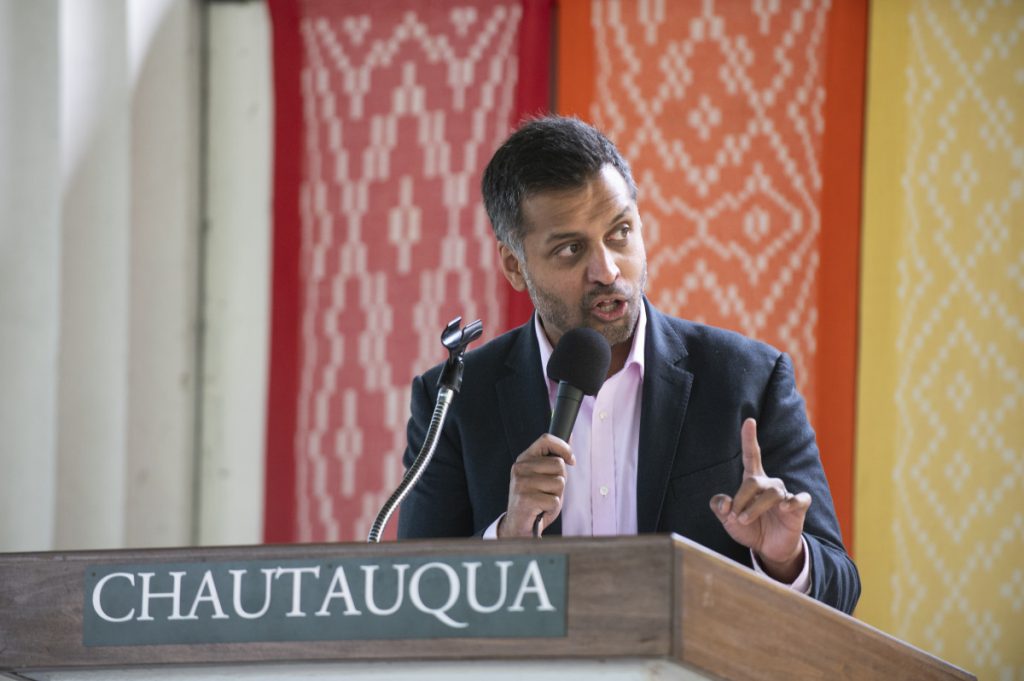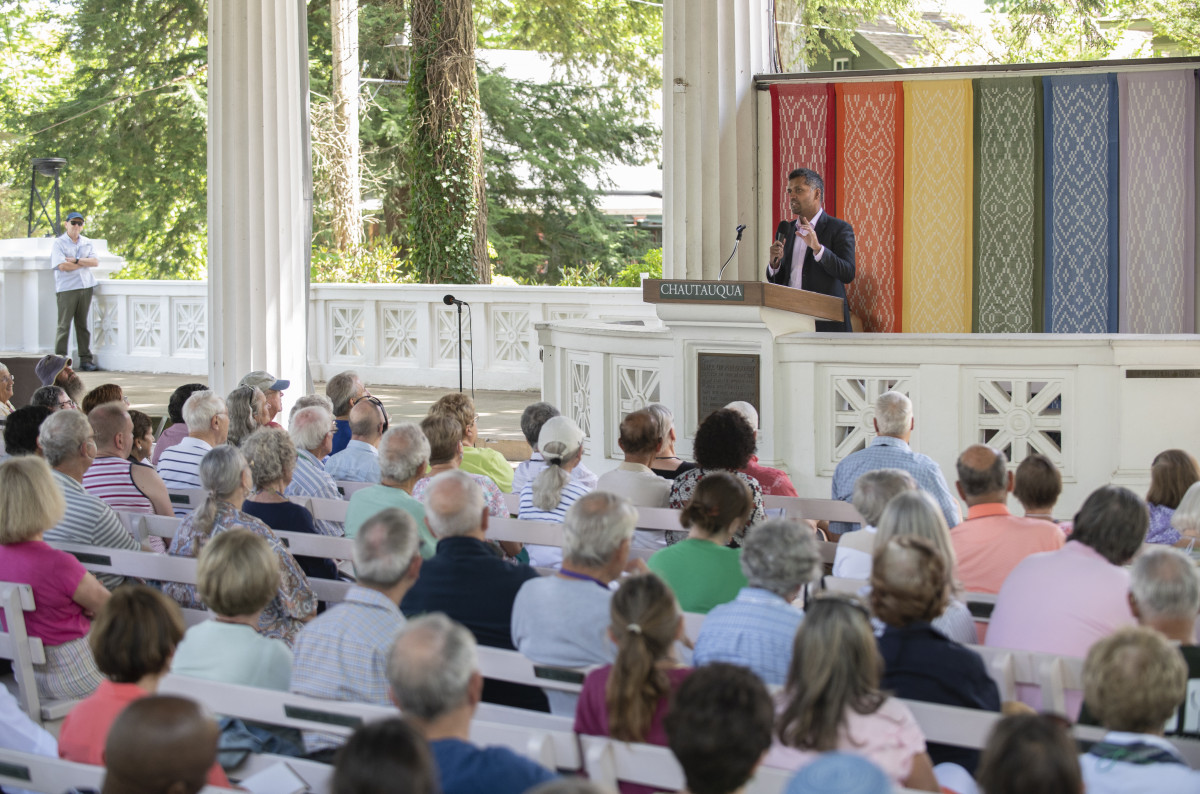Wajahat Ali, a Muslim whose parents immigrated from Pakistan in the ’80s, defied the expectation of his peers. They did not expect him to become a protagonist of the American narrative, but Ali learned to rewrite his destiny in the face of adversity and tribulation.
Ali, now an author, columnist, political commentator and award-winning playwright, closed Week Five of Chautauqua’s Interfaith Lecture Series theme, “The Ethical Foundations of a Fully Functioning Democracy.”
His lecture, “Go Back to Where You Came From: Or, How to Create the Ethnic Avengers,” titled in part after his 2022 book on being part of a family of immigrants, depicted his struggle as an American Muslim — particulary in a post-9/11 world.
Ali spoke on the importance of implementing diverse, equitable and inclusive leadership within the current state of American democracy. Yet, diverse ideas are becoming more and more censored, he said.
“Speaking about diversity can get you fired if you’re an educator. We’re living in a moment where some parents are more comfortable with their kids getting COVID at school or potentially getting shot than reading a book by a Black author,” Ali said. “We’re living in a time where books are being banned. In fact, 1,100 books have been banned in the past year, overwhelmingly by POC writers and LGBTQ+ authors.”

Beyond limiting access to these educational resources, minorities still face dangerous, life-threatening situations in 2022. Even though people are aware of these issues, they remain complicit, Ali said.
“Everyone wants to get to reconciliation. But how do you get to reconciliation without truth? You don’t,” Ali said. “The same people who champion such restrictive actions need to maintain fictional stories and myths about this country because these stories are comfortable, … even if it comes at the expense of truth, equality, fairness, accountability and justice.”
Ali argued that it is important to embrace discomfort, read dangerous books and listen to tough stories. He said it is time to invest in hope, during what seems like hopeless times.
“It will be the necessary medicine that is needed to heal America, and perhaps even save this country. It might even save our lives,” Ali said. “In my opinion, the only way forward in this country … (is to) expand ourselves, our workplaces and our communities so that everyone has a chance to become a co-protagonist of the evolving narrative.”
Ali learned at a young age that these narratives needed to be told to young people in minority communities, as they would have helped him feel more accepted in a society that paints itself as homogenous.
“We’re being told (in 2022) that the age of five, six and seven is too young for kids to learn about multiculturalism and racism,” Ali said. “What’s so funny is that for many people of color, school is when we first learned our place in the American hierarchy. School is when we first encountered racism.”
Ali said that growing up in America as a person of color, he quickly realized that he did not look like the protagonist of the American narrative. The textbooks, billboards, magazines and other forms of media did not show people that looked like him.
“The hero does not have Brown skin or Black skin. At best, I am a sidekick. Or I’m a punchline, or I am a villain. Or I’m completely excised from the story,” Ali said. “What does that do to a young kid? Even though I came from a very loving, super-Brown, super-Muslim, super-American family, you implicitly learn to hate yourself. You learned to hate the color of your skin, the texture of your hair, the shape of your nose.”
Through these struggles inside the classroom, Ali found a calling for storytelling. He reflected on a particular story he wrote in elementary school; his teacher found the story to be so well-written that she made Ali read it to the class.
“I read the story, and I had them. They laughed at all the right parts. They gasped, they applauded,” he said. “For the first time in my life, my peers respected me. … I realized I might have a superpower. Once in a while, I might be able to tell a story. It was intoxicating.”
Even though Ali felt a calling to be a writer, he also felt pressured to become a doctor or an engineer. By the time he was a senior at the University of California, Berkeley, his major was still undeclared.
In 2001, shortly followed by the 9/11 terrorist attacks, Ali stepped up to become a student leader of the Muslim Students Association.
“9/11 was a permanent fork in the road,” Ali said. “… We realized that for BIPOC folks, ‘American’ always comes with an asterisk. It’s always conditional, and overnight, our Americanness was revoked. Overnight, we were the enemy.”
The first time Ali was told to go back to where he came from was on 9/11. Even though he was born and raised in America, he was blamed by some for the tragedy due to his ethnicity.
Ali’s life was about to encounter a horrific challenge: His parents were arrested by the FBI due to Operation Cyber Storm, which at the time, was the biggest anti-piracy crackdown in America.
“My parents had nothing to do with these piracy allegations, right? But it was Microsoft and the FBI, so it was a giant net,” Ali said. “… My parents, upper-middle class, immigrant parents (were now seen as) scammers. Overnight, the American dream turned into the American nightmare.”
When his parents were arrested, Ali’s family lost everything — their money, credit, home and community. And, Ali had to leave school.
“I was able to graduate because my senior thesis professor, Susan Schweik, read about it in the newspaper,” Ali said.
She allowed Ali to take an incomplete grade and submit his thesis late, in December, while he tended to his family.
“Thanks to a teacher stepping up and being kind to a young kid who needed a little bit of help, I was able to graduate,” Ali said. “Coincidentally, that teacher is here today.”
Schweik, a regular visitor to the grounds during the summer season, and Ali were able to reunite for the first time in 20 years.
After graduating in the early 2000s with an English degree from the University of California, Berkeley, Ali pursued a law degree and graduated in 2007. Concurrently, Ali wrote a play, The Domestic Crusaders, which broke box office records during its run at the Nuyorican Poets Cafe, and in fall 2010, was published by McSweeney’s.
His parents’ appeal continued during these nine years of Ali’s professional success. They lost the case when Ali was 30 years old.
“We lost everything again,” Ali said. “Everyone thinks I’m crushing it. All my friends are saying, ‘Wajahat is the one that’s made it.’ Meanwhile, I’m living in hell.”
Despite the losses and challenges Ali has faced during his life — a near-death experience and his daughter’s fight with liver cancer — he has gained wisdom.
“When you hear people say, ‘Well, I don’t see race,’ that means they don’t see racism,” Ali said. “And ignorance, even when it’s sincere and well-intentioned, is also a reflection of privilege. You don’t see because you never had to see.”
As America enters this new era, Ali calls for the supposed “nobodies” to also take action despite the overwhelming catastrophes all around them.
Ali believes all people can leave a positive impact in their local communities and workplaces through awareness, intention and action. They can choose to listen to others’ stories and defy hopelessness.
“Cynicism and apathy is comforting, but it’s also cheap and lazy. It requires zero work. It means you have chosen to be a spectator in life,” Ali said. “Investing in hope is painful, because it means it exposes yourself to disappointment. It exposes yourself to a narrative of pain, where your country will betray you time and time again. But it means you’ve chosen to get into the ring and fight.”





